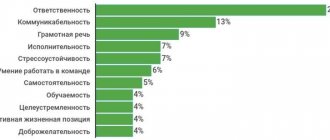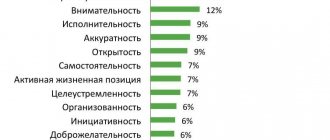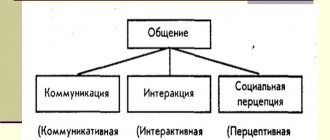Which section of a resume do you consider the most important?
When applying for a job, your application form becomes the only link with your employer. It is difficult to get a good job without the correct presentation of your own capabilities. However, many serious recruiters require filling out an insidious item - character weaknesses.
In a resume, every word written is important. Do not fill out this line hastily!
Your weaknesses on your resume should be a mirror image of your strengths.
Practical psychology: why ask about shortcomings
The requirement to list negative character traits or personality weaknesses serves several purposes. This is a psychological trick of the recruiter, who expects to quickly and comprehensively analyze the characteristics of the candidate’s behavior, the properties of his psyche, human experience and communication skills. The ability to advantageously reflect imperfections, the ability to critically evaluate oneself, the tendency to introspection and awareness of shortcomings - these are mandatory attributes of a mature personality, which is characterized by responsibility, learning ability and the art of cooperation. Any reasonable person understands: ideal people do not exist. Someone's statement about the absence of shortcomings means an incredible phenomenon: the individual has reached the limit of his skills and does not consider further improvement possible.
An employee who is not ready to “grow” personally and professionally, or to learn new trends in the field of work competencies, will not attract the attention of an HR manager. In addition, if the applicant does not see weaknesses or is embarrassed to openly admit them, a psychologically savvy manager may suspect inadequately low self-esteem or, on the contrary, extreme pride, unwillingness to compromise and a tendency towards authoritarian communication. Detecting a candidate's integrity is low on a recruiter's list of goals. Anyone who thinks about this question will come to a clear conclusion: to reveal one’s soul to a stranger means to admit one’s naivety, passive submission, or narrow-mindedness.
You need to skillfully play up the topic of shortcomings, voicing only those that cannot harm your career and employer or can present the applicant in a favorable light.
Choice of qualities
If more than 5 characteristics are included in the resume, this is a signal that the applicant is not able to make an intelligent choice. Moreover, the standard “responsibility” and “punctuality” have become banal, so if possible, ask what these general concepts mean. A striking example: the phrase “high performance” could mean “ability to work with a lot of information”, while you were counting on “willingness to work overtime.”
Such general concepts as “motivation to work”, “professionalism”, “self-control” can be explained by the applicant in other expressions, more specifically and meaningfully. Pay attention to incompatible qualities. To make sure that the applicant is honest, you can ask him to illustrate the characteristics he specified with examples.
Minus to plus, or turning bad character traits into advantages
Imagine a narcissistic egoist, try to understand his worldview. Any personal imperfection in the eyes of such a subject is seen as a funny little thing or an irreplaceable virtue. I remember the Eastern postulate about the relationship between good and evil, good and bad, positive and negative. Everything in the world is relative. For example, such a character trait as stubbornness can turn into perseverance, let’s call hot temper emotionality, and so on.
Selecting softer expressions in your resume will help smooth out negative characteristics, while leaving them in the category of shortcomings.
Some recommendations that will help you present your weaknesses as strengths:
- Search for a synonym whose meaning softens the perception of the property.
- Selecting neutral shortcomings that cannot lead to failure in the labor field:
- fear of travel, air travel and other phobias;
- inability to drive a car;
- computer helplessness – for professions involving manual labor;
- overweight;
- love for sweets;
- shopaholism;
- the tendency to make decisions and act according to one’s opinions;
- inability to adequately respond to rudeness (if the future profession is not related to customer service);
- distrust (or vice versa);
- overdeveloped empathy;
- meticulousness;
- exaggerated love of order;
- tendency to double-check facts;
- slowness in making decisions (if this does not harm the work);
- inability to accurately express one’s thoughts (provided that the applicant is not applying for the position of teacher, journalist, etc.);
- age and lack of experience (if these points are not important for the employer);
- tendency to get too close to people;
- inability to conflict and so on.
- Indication of character traits that in everyday life are considered rather a flaw, but turn out to be useful in work:
- increased anxiety;
- straightforwardness;
- reliability;
- excessive sociability;
- persistence;
- pickiness;
- workaholism;
- over-responsibility;
- slowness;
- tendency to self-criticism;
- hyperactivity.
- Selection of qualities related to profession. This approach must be applied in any case to avoid discovering a decisive flaw. Here it makes sense to show a selection of weaknesses using examples:
- professions associated with the scrupulous study of data that require concentration and attentiveness - accountant, lawyer, engineer, proofreader and the like. Suitable characteristics for them include distrust, adherence to principles, excessive meticulousness, increased anxiety (not for the level of a chief specialist), pedantry, straightforwardness, inability to lie, increased demands on oneself, modesty, difficulties in communication and self-esteem (not for the head of a department, lawyer consulting clients), hyper-responsibility, lack of diplomacy and authoritarianism (can harm a candidate for a leadership position if the organization has adopted a democratic style in relations with subordinates);
if your future work is related to communication (sales manager, store consultant, waiter, doctor, massage therapist, trainer, call center operator, etc.), you should adhere to a different list: hyperactivity, impulsiveness, restlessness, self-confidence, distrust, workaholism, excessive sociability;
- Managerial employees need to write with caution about their shortcomings, focusing on the requests of the vacancy and collecting data about the future employer. Universal qualities are suitable: pedantry, straightforwardness, excessive tendency to introspection, love of little things, emotionality, workaholism, demandingness, distrust, making individual decisions, disposition to double-check facts, hypertrophied responsibility, formalism.
There is no need to list the entire list of negative qualities. When selecting personality weaknesses for a resume, it is enough to indicate 2-3 points.
What to include in the “key skills” section when filling out your resume
What not to write
Under no circumstances do recruitment experts recommend pointing out laziness as a shortcoming. Even if you have a habit of being lazy on weekends. The second taboo is the fear of taking responsibility. Since any specialist, to one degree or another, has to make independent decisions dictated by professional necessity and it is foolish to avoid this.
You should also not highlight the habit of sleeping longer, unpunctuality and inattention.
It is also not recommended to attribute to yourself negative qualities that you do not possess in order to look better and more objective in the eyes of the employer. It is better to choose 2-3 weak traits than to indicate a list that is at odds with reality.
Objective disadvantages
A special case consists of fundamental aspects of the work history, life history or health status, which may negatively affect the professional suitability of the applicant. Is it advisable to note such shortcomings or is it wiser to remain silent about them? Of course, if there is a corresponding column in the applicant’s application form, it is more rational to indicate truthful information, otherwise unpleasant information will be revealed during an interview or during a check by the company’s security service. If the employee’s exact compliance with certain parameters is important for the employer, it is better to find out this at the stage of sending the resume. Objective imperfections can be divided into the following categories:
- lack of experience or irrelevant (that is, useless for the position being sought) skills;
- unsightly aspects of the biography (long break in work experience, criminal record, etc.);
- inconsistency with the position in terms of age, nationality, citizenship, gender;
- significant deviations in health;
- bad habits.
Qualities for different professions
Certain professional qualities are needed in almost all types of activities. You can make it easier for applicants and at the same time narrow their circle by including information about the required characteristics in the job advertisement. For an employee in the field of promotion or entertainment, the main qualities are communication skills, the ability to work in a team, and to win people over. The list of winning qualities will also include: charm, self-confidence, energy. In the field of trade, the list of the best qualities will look like this: flexibility of thinking, skills in interacting with clients, the ability to negotiate, work in a team, as well as quick response, politeness, perseverance, and activity.
A leader in any field must have such professional qualities as organizational skills, the ability to find a common language and work in a team, resourcefulness, lack of conflict, charm and the ability to teach. Equally important are the ability to make quick decisions, self-confidence, attentiveness and balance.
The strengths of an employee working with a large amount of data (accountant or system administrator): attention to detail, accuracy, quick learner, attentiveness, organization and, of course, the ability to work with a large amount of information.
The characteristics of a secretary include a variety of positive qualities: skills in interacting with clients, business communication, literacy, ability to negotiate and conduct business correspondence, and the ability to deal with several things at the same time. Also pay attention to good external characteristics, attentiveness, tact and balance, and diligence. Responsibility, attentiveness and stress resistance are useful in any profession. But the applicant, adding such qualities to his resume, does not always take them seriously.
Responsibility, attentiveness and stress resistance are useful in any profession. But the applicant, adding such qualities to his resume, does not always take them seriously.
Techniques for neutralizing objectively vulnerable points in a resume
- Any flaw found in an applicant’s application form can ruin hopes for employment in a given company. Therefore, in such cases, it is especially important to duplicate the resume with a cover letter - an additional document that is attached to the main one and reviewed first. Moreover, in many large corporations, especially subsidiaries of foreign companies, the presence of a preliminary message is mandatory. The accompanying message is sent by mail or fax before the resume, and in the electronic version it is inserted into the body of the letter and contains a link to the attached file. This is an excellent way to “catch” the employer’s attention, an attempt in absentia to build a more trusting relationship and highlight your advantages. When the recipient proceeds to review the resume, a favorable beginning of contact with the “problematic” applicant will help smooth out the “sharp corners” in the main presentation. It is important that the applicant for the position must pay close attention to drafting a competent, logical, and easy-to-read cover letter text. Here are a number of recommendations that will help when working on such an appeal:
- the letter should be concise, contain no more than 10 sentences, 3–5 paragraphs, occupy a volume of 1000–1500 printed characters (about ½ A4 sheet);
- clear organization of information will allow the employer to quickly read the message without spending a lot of time. Structure:
How a cover letter will help you get a position
– greeting and addressing the head of the organization/vacancy supervisor (preferably by name or using neutral “Dear Sirs!”, “Good afternoon!”, “Hello, ...!”);
– selection of the main block;
– polite farewell (“With respect, …”, “With respect and hope for further cooperation, …”);
– the final part indicating contact information;
- use a business style, excluding humor, familiarity, colloquial and slang words, and phrases. The formal tone and emotionality of the letter will soften constructions with an address and farewell, an expression of readiness to come for an interview and a desire to receive feedback. The phrases “I would be sincerely glad if you consider my candidacy suitable for this position”, “I look forward to your call”, “Thank you for paying attention to my resume” will sufficiently enliven the strict language of a business message, personalize the letter and create a living image of the sender;
- An example of the main block of a cover message that can be taken as a model for a doubting applicant:
“After working as an accountant for about 20 years, I decided to return to my old dream and take up photography professionally. Having taken courses in photography (I have attached a certificate) and refreshed the knowledge I acquired in the school club and during my student passion for photography, I began to have a good understanding of today’s trends and trends in photography, studied modern equipment and met many interesting figures in the Moscow photography community. Having independently figured out graphic editors (list), I got the opportunity to digitally process and refine images. The process of shooting and working with a model, searching for interesting shots at public events, and subsequent work with photographs excites and intrigues me. I am sure that my artistic abilities, independently acquired skills, and the habit of continuously developing and learning new things will be a good basis for starting cooperation with your agency.”
- Another method will also help to balance the weak points. You can expand those blocks for the questionnaire, the information in which will highlight the competitive advantages of the applicant. Sections that are often ignored by experienced specialists with a long track record and developed professional skills will come in handy here. These are “Personal qualities”, “Hobbies and interests”, “Additional information”. If the standard version recommends listing only 3–5 personal characteristics, then if the resume is not ideal, you will have to increase the scale of the positive aspects. The “Hobbies” item, as well as “Personal qualities”, must be filled out taking into account the requirements of the vacancy. It’s great if a novice graphic designer brings drawing as a hobby, and a candidate for an engineer’s position brings modeling of radio-controlled aircraft. Inappropriate hobbies will probably cause confusion and a smile for the HR manager, but in some cases they will manage to interest you. In pursuit of the goal of pleasing the employer, it is necessary to create a targeted resume, conduct preliminary research on each potential employer, and adapt the documents sent to the specific recipient. For example, on the website of the cherished employer there was a special section dedicated to the social life of employees, photographs of joint trips were posted. If the corporate spirit of the organization is sufficiently developed and the staff demonstrates an active lifestyle, then mentioning mountaineering, skiing, running and yoga as a hobby can play on the human factor of the personnel employee and push him to a positive decision on the candidate. “Additional information” is another section of the resume that you need to skillfully use to your advantage. What to write to a person who is trying to get a job as a sales manager? Having considered possible job responsibilities and re-read the requirements for such vacancies, you can find many positions that successfully connect the aspirations of the employer and the capabilities of the applicant. Having your own car, willingness to travel on business trips and irregular work schedules, proficiency in foreign languages or computer programs, good knowledge of the city and similar or not related to the vacancy will add “pluses” to the overall treasury.
What goals should you include in your resume?
People's shortcomings are not permanent. Weaknesses in character are a good reason to work on yourself, and unpleasant moments in your biography can be turned to your advantage by analyzing the reasons and turning them into valuable experience. Following in this vein, you can present any unpleasant feature of the applicant from an advantageous side and reflect these characteristics in your resume.
Business and personal qualities
An employee’s business qualities are his ability to perform certain job duties. The most important of them are the level of education and work experience. When choosing an employee, focus on the benefits he can bring to your company.
Personal qualities characterize an employee as a person. They become important when applicants for one position have the same level of business qualities. Personal qualities characterize an employee’s attitude towards work. Focus on independence: he should not do your work, but must cope with his own to the fullest.
| Business qualities | Personal qualities |
| The level of education | Accuracy |
| Specialty, qualification | Activity |
| Work experience, positions held | Ambition |
| Labor productivity | Non-conflict |
| Analytic skills | Fast reaction |
| Quick adaptation to new information systems | Politeness |
| Fast learner | Attentiveness |
| Attention to detail | Discipline |
| Flexibility of thinking | Initiative |
| Willingness to work overtime | Performance |
| Literacy | Communication skills |
| Mathematical thinking | Maximalism |
| Customer interaction skills | Perseverance |
| Business communication skills | Resourcefulness |
| Planning skills | Charm |
| Report preparation skills | Organization |
| Oratorical skills | Responsible approach to work |
| Organizational skills | Decency |
| Enterprise | Devotion |
| Professional Integrity | Integrity |
| Scrupulousness | Punctuality |
| Ability to handle multiple projects simultaneously | Determination |
| Ability to make quick decisions | Self-control |
| Ability to work with large amounts of information | Self-criticism |
| Strategic Thinking | Independence |
| Striving for self-improvement | Modesty |
| Creative thinking | Stress resistance |
| Ability to negotiate/business correspondence | Tact |
| Ability to negotiate | Patience |
| Ability to express thoughts | Demandingness |
| Ability to find a common language | Hard work |
| Ability to teach | Self confidence |
| Skill to work in team | Equilibrium |
| Ability to put people at ease | Determination |
| Ability to persuade | Honesty |
| Good appearance | Energy |
| Good diction | Enthusiasm |
| Good physical form | Ethical |
Assessment of employee professional qualities
To avoid wasting time and money testing new employees, companies sometimes evaluate them before hiring. There are even special personnel assessment centers created for this purpose. A list of assessment methods for those who prefer to do it themselves:
- Letters of recommendation.
- Tests. These include routine aptitude and aptitude tests, as well as personality and biographical tests.
- An exam on the knowledge and skills of an employee.
- Role play or cases.
Role-playing will help you find out in practice whether the applicant is suitable for you. Simulate an everyday situation for his position and see how he copes. For example, evaluate his customer interaction skills. Let the buyer be your competent employee or yourself, and the applicant will show what he is capable of. You can set a goal for him to achieve during the game, or simply observe his working style. This method will tell you much more about the applicant than the “Personal Qualities” column on a resume.
When deciding on evaluation criteria, you can base your assessment on business qualities: punctuality, potential quantity and quality of work performed, experience and education, skills, etc. For greater efficiency, focus on the qualities required for the position for which the candidate being assessed is applying. To be confident in an employee, consider his personal qualities. You can conduct an assessment yourself in the form of a ranking of candidates, placing + and – according to certain criteria, distributing them by level or awarding points. Avoid assessment pitfalls such as bias or stereotyping, or placing too much weight on one criterion.
Which section of a resume do you consider the most important?
Poll Options are limited because JavaScript is disabled in your browser.
When applying for a job, your application form becomes the only link with your employer. It is difficult to get a good job without the correct presentation of your own capabilities. However, many serious ones require filling out an insidious item - character weaknesses.
In a resume, every word written is important. Do not fill out this line hastily!
Your weaknesses on your resume should be a mirror image of your strengths.
Strengths and weaknesses of a person
The strengths and weaknesses of a person are closely related and should not contradict each other. Each person has their own disadvantages and advantages. As a rule, we are used to talking about strengths, but we are often silent about weaknesses.
An independent, goal-oriented and self-critical person always recognizes that there are many weaknesses in his character. And there's nothing wrong with that. We are all humans. But every purposeful person can turn his shortcomings into advantages through painstaking work on himself.
So, what are a person's strengths and how to find them? To do this, first of all, pay attention to your talents and skills. This is where you will find your strengths. When you have found your advantages, pursue them and develop them. This will allow you to open up to your fullest potential.
If you cannot independently determine your strengths for the questionnaire, ask your acquaintances and friends for help. Thanks to their opinions, you may discover advantages in yourself that you were not aware of before. And in some ways your opinion will agree with the opinion of your friends.
In addition to the strengths on your resume, there is often a question about your weaknesses. There is no need to be ashamed of them. If you claim that you have no negative character traits, this will become a sign to the recruiter of an undeveloped personality. Which is unlikely to help you get the desired position in the future.
Table 1 - Strengths and weaknesses
| Your strengths if you: | Your weaknesses may include: |
| Results-oriented | Inability to remain silent in time |
| Tenacious | Excessive emotionality |
| Hardworking | Lack of willpower |
| Strong-willed personality | |
| Confident | Inability to speak in public |
| Sociable | Excessive irritability and aggressiveness |
| Organized and independent person | |
| You perceive information well | Formalism |
| Learn quickly | Hyperactivity |
| Responsible for their own actions and the actions of their subordinates | Fear of traveling by air and sea |
| Disciplined | Inability to lie |
| Love your profession and work | Integrity |
| Active and energetic person | Lack of flexibility |
| Patient | Modesty |
| Honest and don’t like to lie | Excessive self-criticism |
| You have organizational skills | Straightforwardness |
| Love for formalism | |
| Punctual | Pedantry |
| Are you a good performer? | Self-love |
| Scrupulous | Impulsiveness |










